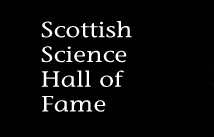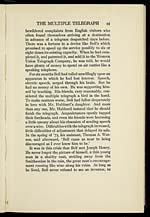Alexander Graham Bell (1847-1922)
Alexander Graham Bell : the man who contracted space
THE MULTIPLE TELEGRAPH
II
bewildered complaints from English visitors who
often found themselves arriving at a destination
in advance of a telegram despatched days before.
There was a fortune in a device like Bell's which
promised to speed up the service possibly to six or
eight times its existing capacity. When he had com-
pleted it, and patented it, and sold it to the Western
Union Telegraph Company, he was told, he would
have plenty of money to spend on air castles like a
speaking telephone.
For six months Bell had toiled unwillingly upon an
apparatus in which he had lost interest. Speech,
electric speech, surged through his brain. But he
had no money of his own. He was supporting him-
self by teaching. His friends, very reasonably, con-
sidered the multiple telegraph a bird in the hand.
To make matters worse, Bell had fallen desperately
in love with Mr. Hubbard's daughter. And more
than any one, Mr. Hubbard insisted that he should
finish the telegraph. Acquaintances openly tapped
their foreheads, and even his friends were becoming
a little uneasy about his obsession of sending speech
over a wire. Difficulties with the telegraph increased,
little difficulties of adjustment that delayed its sale.
In the spring of 75, his assistant, Thomas A. Wat-
son, said afterward, ‘ Bell came as near to being
discouraged as I ever knew him to be.’
It was in this crisis that Bell met Joseph Henry.
He never forgot the picture of himself, a thin young
man in a shabby coat, striding away from the
Smithsonian in the rain, the great man's encourage-
ment running like wine along his veins. As long as
he lived, Bell never refused to see an inventor, to


